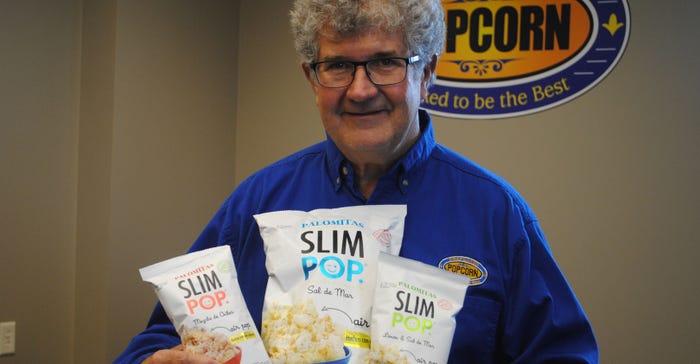
Nebraska is the Popcorn State. The state typically ranks at the top of the list with more popcorn production than any other, often trading the top spot with Indiana.
During the nation’s drought in 2012, farmers in the state produced roughly 45% of all the popcorn grown in the U.S. In 2017, nearly 66,000 acres were planted to popcorn in Nebraska. The state traditionally has higher yields because of access to irrigation.
Farmers have banded together to not only produce a high-quality popcorn product, but also market their crops. Norm Krug, who farms in the Platte River valley near Chapman, and several farming friends joined forces with Aurora Cooperative to form Preferred Popcorn in 1997.
“Our original plan was to grow popcorn and market it to Nebraskans,” says Krug, Preferred Popcorn CEO. “After that first season, we had 300 truckloads of popcorn ready to go to market, but didn’t have a place established to sell it,” he recalls. “That’s when we started to look at international markets.”
So, the company’s original vision has evolved, and now Preferred sells popcorn to 70 countries and has a product line that includes bulk popcorn, flavored microwave options, organic popcorn and popcorn kits for concessions.
In addition, the company is completing a 22,500-square-foot processing facility and adding 10 more employees to their headquarters in Chapman. Over the past few years, the company acquired another plant in Palmyra, Ind., and an organic popcorn processing plant in Trenton, Mo.
Krug says that Preferred Popcorn has about 17,000 acres under contract in Nebraska, with about the same number of acres in Indiana. Overall, the company has growers in seven states.
“It all kind of started around our kitchen table when I was growing up,” Krug recalls. “My father raised popcorn for 45 years. We had a popcorn plant called Tyler Popcorn here in Chapman. Dad would make popcorn at home every night, and he’d experiment with all kinds of different flavors.”
Krug graduated with degrees in animal science and ag economics from the University of Nebraska in 1978, and returned home to the family farm, where they were growing corn, soybeans and popcorn. In 1997, when grain margins were low and prices were depressed, Krug was looking for ways to add value to his operation.
The popcorn plant in Chapman had been vacant for two years, so he and a few farming friends had an idea. They purchased the plant and began their own company. “We already knew how to produce popcorn, but we wanted to find a way to add value to our product,” Krug says. “This part of Nebraska has the right humidity and fertility to produce high-quality, good-tasting popcorn.” Popcorn farmers in the area have an advantage, Krug says. “We had the fundamentals of production down,” he notes. “While the price of popcorn is still tied to corn prices, there is no basis, and the popcorn premiums are above the corn and soybean margins.”
Using his education in economics, Krug began to look for markets. Living in a relatively sparsely populated state with lots of competition for domestic markets, they started looking to exports. “We attended trade shows and began to learn about opportunities in international markets,” Krug explains.
In 1998, the company sold their first loads of popcorn to Indonesia. By 2000, they began exporting to Mexico, which is now the company’s largest international market. “Over 94% of the popcorn consumed in Mexico is grown in the U.S.,” Krug says. “That’s over 100 million pounds a year.”
Krug returned recently from a trade trip to Mexico where Preferred Popcorn launched a healthy line of ready-to-eat popcorn, including a chili flavor, which heralds back to Krug’s childhood days when his father experimented with flavors at home. They also sell popcorn to Asia, the Middle East, Africa and Canada, among numerous other regions around the globe.
When the company started, there were naysayers. Krug admits that it is unique to have a cooperative of individual farmers, but the founding farmers and subsequent partners of Preferred have gotten along well and grown far beyond the goals they originally thought were possible.
Krug says that popcorn works well into the corn and soybean rotation. Because popcorn is non-GMO, a variety of non-glyphosate herbicides are used in raising the crop and this provides a rotation away from glyphosate, slowing the occurrence of resistant weeds. “It works best when popcorn follows soybeans, because we don’t have to worry about volunteer soybeans in our popcorn fields the following year.”
Corn borer and rootworm are typical pest concerns for popcorn farmers, just like field corn. With the growing consumer demand for organic food choices, organic growers in Missouri are using cover crops in their management to help combat weed pressure and maintain fertility, Krug says.
The popcorn industry has been kind to Krug, his partners and their growers. Now, 20 years after that first load of popcorn was sold to Indonesia, the company looks forward to opening new markets and building a new customer base for products coming down the road.
Learn more about Preferred Popcorn at preferredpopcorn.com.
About the Author(s)
You May Also Like






